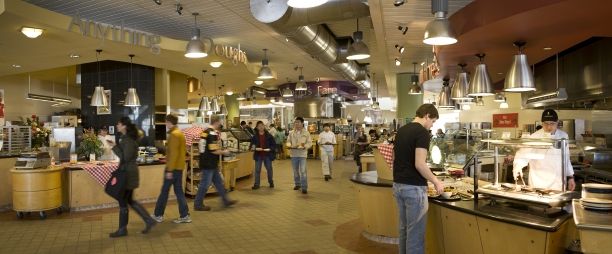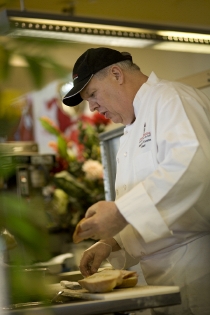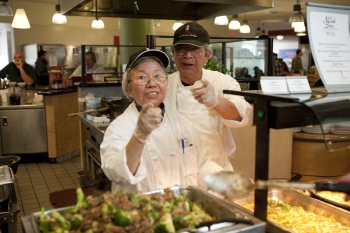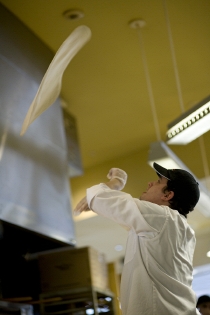FOOD & WINE
North Star eatery provides east-west choice and taste on a grand scale

North Star dining, located in the Appel Commons on Cornell's North Campus, serves 2,600 meals a day. See larger image
To clear your palate before reading, remove the word "cafeteria" and the term "food factory" from your mind. Good. Let's go.
North Star, located in the Appel Commons on Cornell's North Campus, offers a diverse, all-you-care-to-eat dining experience that is actually healthful – if you choose to make it so – and "choose" is the operative term here.
The university's flagship dining hall represents what Cornell dining administrators, executive chefs, nutritionist, frontline cooks and staff all refer to as a shift in "dining culture" at Cornell (think: bamboo-steamed dim sum, couscous, vegan pizza with locally grown tomatoes on a dough made from scratch).
The seating at North Star is not plush, and the facility serves some 2,600 meals daily. But much of what is found here is as good or better (think: New York maple syrup) than what's offered at the more upscale, intimate eateries in the area. North Star staff operate six food stations and excel at cooking to order, serving kosher items, preparing a variety of ethnic cuisines as well as vegan and vegetarian dishes. In addition, there is one station dedicated to gluten-free foods – a health-conscious nod to the rise in food allergies.
Oh, there's a full salad bar, too (also think: fresh fruit). And don't forget the dessert station – not that anyone ever does.

Harold Evans, executive chef for North Star dining. See larger image
"Of course we want to feed the students properly, first and foremost," says Harold Evans, executive chef for North Star. "But at the heart, quite literally, of what we are doing, is educating our customers on how to make intelligent, healthy, good-tasting food choices, now – and for the rest of their lives."
Evans is former owner of three restaurants; former three-year guest chef to the U.S. Tennis Open, Playboy Clubs and the Hyatt chain. You'd expect to find him in an urban setting, running his own show. But he liked what he saw when he was hired by Cornell Dining Director Gail Finan, who has been driving Cornell's food culture revolution.
Evans' specialty is on the rich and robust side. But two life-changing events altered his ideas about food and eating in general. First, he became diabetic. Then his son converted to Judaism and now eats kosher.
"My palate and my ideas of what constitutes a good meal have evolved," he says. "It was a big change for me, but a good one."
Evans adds that, by following Cornell Dining's Eating Well plan, he's lost 25 pounds since taking the job in September 2008 and says he has more energy as a result. As for his responsibilities as head chef, he credits Cornell nutritionist Michele Wilbur for constant reminders when creating and planning wholesome menus.
Wilbur– who works in tandem with Cornell Dining's Executive Chef Steve Miller – is a savvy food scientist and a force behind much of the change in Cornell Dining across its 30 campus eating facilities. For example, all culinary and line staff are now trained in National Environmental Health Association practices and are fully informed about food allergies; trans fats are not used in any Cornell kitchens; as often as possible, ground beef is sourced from local, lean-bred cattle; low-fat dairy items are produced by Cornell Dairy; $2 million a year is dedicated solely to purchasing regional fruits and vegetables from July to October; and Cornell Dining, which serves about 35,000 pounds of fish a year, follows the Monterey Bay Aquarium's sustainable fishing guidelines for restaurants and consumers.
From town to gown

King and Jean Tang run one of the dining hall's most popular food stations. See larger image
At the center of North Star's flowing Feng Shui-influenced food court is a town-gown story homegrown in the best sense: Chinese-American food vendors King and Jean Tang. The Tangs are former owners of the popular Asiatic Garden, a downtown Ithaca icon for more than three decades. They came to North Star in 2001.
"This was a great move for us," says Jean Tang. "We closed up the restaurant in spring of 2001, and by August we were here."
King Tang's father was a cook aboard U.S. Navy ships and eventually settled in Syracuse, then came to Ithaca where he opened Asiatic Garden.
"For new Chinese immigrants in the East [in the 1920-'30s], you either went west to work on the railroads or to the cities to work in restaurants and laundries," says King Tang, who was born in Syracuse and raised in Ithaca. Jean came to the United States from China in 1965. When she speaks about a happy marriage, she's not just referring to her relationship with King, but to their relationship with Cornell Dining and North Star, she says.

Flipping pizza dough at a food station. See larger image
"We know the students by name and what they like to eat and serve them special meals if they ask. Sure, we may be serving many more people during a dinner or lunch than we used to, but once we're done, we're done."
Cornell alumni who know the Tangs from downtown come to North Star for a meal when they're on campus – and a whole new generation of alums who know them from North Star are coming back to see them again, King says.
The Tangs prepare dinner Monday through Thursday (their eggs and rice in oyster sauce is a daily favorite); on Fridays they handle lunch. Tuesdays they are truly the center of attention for their weekly Cantonese-style General Tso's chicken (which can draw about 1,100 students, faculty and staff).
Their weekends are their own business.
"We didn't have any trouble getting used to that schedule," says Jean, beaming.
For more about North Star dining: http://www.campuslife.cornell.edu/campuslife/dining/north-star.cfm
Eating Well with Cornell Dining program: http://www.campuslife.cornell.edu/campuslife/dining/nutrition.cfm
CU in the Kitchen: "Nutrition Made Delicious" video: http://www.cornell.edu/video?videoID=1080